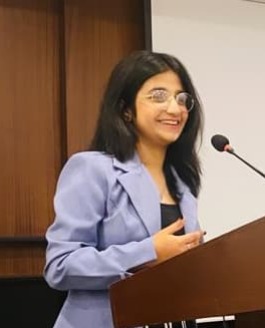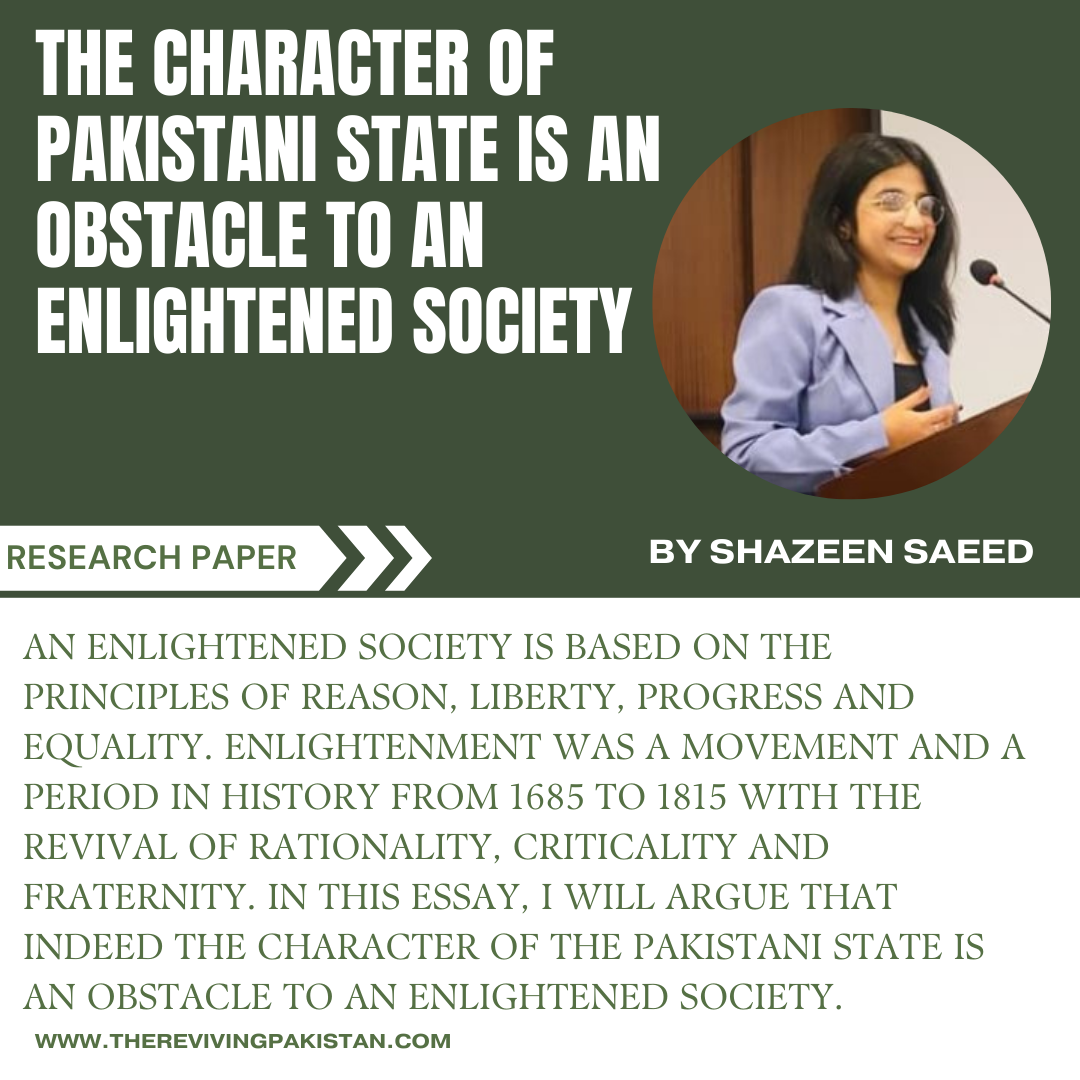Table of Contents
About the Author(s)

Shazeen Saeed
Author is a women rights activist and climate advocate. Student of Beaconhouse National University.
Introduction :
An enlightened society is based on the principles of reason, liberty, progress and equality. Enlightenment was a movement and a period in history from 1685 to 1815 with the revival of rationality, criticality and fraternity. In this essay, I will argue that indeed the character of the Pakistani state is an obstacle to an enlightened society.
My contention is premised on three counts. Firstly, I would argue that the ideological basis i.e religion for creation of Pakistani state was a mere tactic to manipulate and to divert people and fulfill their own needs under the guise of religion as it was said by Abu-Al-Kalam-Azad. Secondly, states where women are subjugated, discriminated against and institutionally domesticated can not reach the zenith of progress and fraternity. Lastly, my premise is based on the poorly managed governmental institutions and poor governance leading to unstable democracy becoming a major cause of upheaval which leads to dystopia and development of an ignorant state.
In this essay, I will be elaborating above argued premises with the context of Pakistan’s history and case study relating premises to the contemporary conditions and events that left a mark and an ebb on Pakistan’s character.
Main Body:
My first premise is based on the flawed ideology of Pakistan which prompted religious intolerance and extremism. Firstly, making religion as a base for creation of a state diminishes the chances of acceptance of different religions and opinions. In an article published by The Washington Times, it is explained that the religious foundation of Pakistan discriminated against other religions. Through this ideology the Pakistani state was being given a religion. Its practical implication was done in the form of Objective Resolution in 1949. This objective resolution was enshrined in the constitutions of Pakistan. It did not promise any protection of minorities and brought religion in every realm of country’s matters ( (Minhas, 2010). The minorities who stood up against this resolution were not catered. All the amendments posed by them were declined which gave way to the hatred and enmity between minorities and majorities. The discrimination done against Shias, Christians, Hindus, Ahmadis, Sikhs is huge. According to a report by South Asia Terrorism Portal, there have been 446 incidents of violence against Shia Muslims in Pakistan between 2003 and May 2016.
Pakistan became a strictly religious state with the emergence of Zia’s Islamization. He introduced ‘Sharia Law’ and being a Sunni muslim himself implemented Sunni beliefs onto the people diminishing the ideas of freedom of speech and expression. It encouraged people becoming fundamentalists which is very much prevalent until now. The biggest hurdle in Pakistan not becoming an enlightened society is unwanted intrusion of religion with the state matters by molvis, ulemas and the so called religious scholars ( Farhan, 2020)
Secondly ! Pakistan, a country with 51% population of women, has not a good record with women rights and protection. A state where women subjugation and domestic violence is a norm can not reach the height of succession. Based on religious, cultural and stereotypical norms women are not allowed to go out for jobs and education and are institutionally domesticated. Based on statistics, a country where more than half of its population constitutes women, Pakistan has lowest female labor force participation in South Asia. A society where there is no safe environment for women to acquire education and do jobs, where harassment, rape culture, honour killings, domestic violence is prevalent can not practice equality and fraternity. It leads to decline in economic participation, decreased productivity overall for a state which hinders autonomy and development. According to a report by the United Nations Population Fund (UNFPA) 32% of women have experienced physical violence in Pakistan.
Based on my previous premises, religion and culture is used as a base to give superiority to men labeling women as weak, to stop women from education, domesticating them, and suppressing them. Such society considers gender equality as a myth and rather focuses on pinning down women in every phase of their lives. The normalization of these heinous acts has placed Pakistan on 153rd ranking on the Global Gender Gap Index (Violence Against Women Rampant in Pakistan, ANI). If we ponder upon the societies which enjoy the perks of enlightenment and reasoning, have always involved women by giving them an equal rank and opportunities so they can reach to a level of progress by participating in making the economy better and promoting social cohesion among its peers.
Thirdly, I would argue that the poor governmental structures, be it the judicial system, bureaucracy or military establishment has played a pivotal role in obstructing Pakistani society from becoming an enlightened one. Since the inception of Pakistan, the military and bureaucracy have been very powerful and are the controlling forces of this country. A state where there was a changing of seven prime ministers, 3 commander in chiefs, and 4 Governor Generals during a time period of 1947-1956 leading Pakistan towards autocracy. Jawaharlal Nehru on this situation of Pakistan wittingly said that :“ I have not changed my shorts as many times Pakistan has changed its prime ministers”.
Pakistan has remained under military rule for more than three decades. Multiple military coups, political instability, weak institutions like frail judiciary system, change of posts of bureaucratic officials with change of government, assassinations of political leaders, lack of accountability and transparency by institutions( (Hussain, 2015) Due to corruption being done at governmental level with no particular repercussions, leading to worse socio-economic conditions, corruption has now become a part of health and educational institutions. According to Corruption Perceptions Index 2023 Pakistan is ranked 133 out of 180 countries. With such prevailing conditions, where corruption and lawlessness is prevalent and there’s no rule of law and the state works as per the landed aristocratic and powerful people in power, there are little chances of freedom of speech and expression.
Case Study:
For case study, I would relate the premises to certain prominent events of Pakistan’s history. Recently our country has encountered a case of religious atrocity i.e ICHRA CASE where fundamentalists were willing to kill a woman based on some misunderstanding. The case of Noor Mukaddam, the motorway case where women needed most protection were rather victim-blamed. It shows the frailness of the institutions and the people who raise their voices against atrocities like Faiz Ahmad Faiz, Arshad Sharif, uncountable Baloch people etc are killed and every possibility of freedom of speech and expression is being taken away.
Conclusion:
All the aforementioned arguments can be used to justify the claim that the character of the Pakistani state is an obstacle to an enlightened society. The essence of enlightened society lies in equality and progress which is nowhere seen in Pakistan with such unequal distribution of power and resources, freedom and progress is enjoyed by few at the expense of many.

